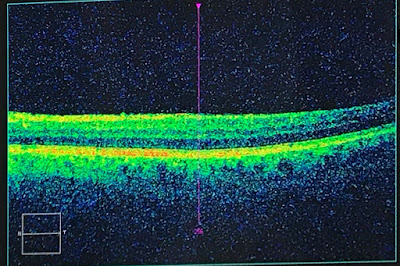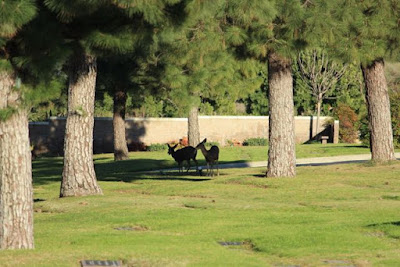We've had sunny days and I have not being able to ride the bike. I can pretend to walk normally now, but the right knee is still bigger than the left. But now when I do something wrong, I feel pressure instead of serious pain. The pressure is a buffer that stops me before I get to the pain part. And I can move the leg more - obviously enough to walk. Getting into the car required some thinking about how to position my leg to get it in.
It also means that I let J do the driving today, which means I can take pictures. I had an eye appointment.
We could see the mountains in the distance, but the sun seems to have gotten rid of most of the snow we saw last week.
The doctor's office is in Beverly Hill, but it still costs much less than it would in Anchorage. Besides, I've been going to this doctor since 1975 as he reminded me today. "You're one of my oldest, no I should say, longest regular patients." We were both young back then and we've seen each other once every one to three years or so all this time. We talked about grandchildren today. He has a new granddaughter as of Saturday. And I'm also one of the most distant patients he has. Last year when I asked him how long he'd be practicing, he said as long as you keep coming, I'll be here. We'll see. Here's what my eyes looked like today. Or one of them at least.
This vehicle was in the parking lot behind his office. Is there any hope for global warming when people have enough money they can buy toys like this and they do instead of working to slow down global warming? But, of course, I know nothing about the owner of this vehicle. I'm creating a persona based on big wheels.
On the way back we decided to go to a Persian restaurant in Westwood.
While I eat very little meat, Persian lamb shank once a year is one of the exceptions. And as I was paying, I realized this was a good chance to ask someone with Iranian connections about the US assassination of General Soleimani. While I kept hearing quotes about what an evil man he is and how many Americans and civilians he's killed, I thought about how the US helped get rid of President Allende in Chile in 1973. And all the civilians who have died as 'collateral damage' of US strikes in the Middle East.
The waiter said they weren't allowed to talk about this in the restaurant. And then he did. I didn't tell him I was a blogger or ask for permission to post his comments, because I didn't think about it until we left. So I won't. But did just recently get back from visiting his family and he's worried things will get worse for them because things will get worse for everyone.
Here's the window of a bakery we passed.
And a Persian book store.
Meanwhile I checked and the subways in Santiago are working again, but protestors are still out on the streets. I guess since they aren't being violent, we don't hear any more about it.
[UPDATED Jan 4, 2020 12:20 am: Since I shortchanged you on the discussion fo the assassination, I thought I'd offer this insight from Chris Hedges. Hedges resigned from the NYTimes after an award winning career covering the Middle East and other key areas. He's way out of the mainstream, but that's because he isn't afraid to take on the taboo subjects of American journalism. Here's the link to the article and an excerpt:
"The targeting of Soleimani, who was killed by a MQ-9 Reaper drone that fired missiles into his convoy as he was leaving the Baghdad airport, also took the life of Abu Mahdi al-Muhandis, the deputy commander of Iran-backed militias in Iraq known as the Popular Mobilization Forces, along with other Iraqi Shiite militia leaders. The strike may temporarily bolster the political fortunes of the two beleaguered architects of the assassination, Donald Trump and Israeli Prime Minister Benjamin Netanyahu, but it is an act of imperial suicide by the United States. There can be no positive outcome. It opens up the possibility of an Armageddon-type scenario relished by the lunatic fringes of the Christian right.
A war with Iran would see it use its Chinese-supplied anti-ship missiles, mines and coastal artillery to shut down the Strait of Hormuz, which is the corridor for 20% of the world’s oil supply. Oil prices would double, perhaps triple, devastating the global economy. The retaliatory strikes by Iran on Israel, as well as on American military installations in Iraq, would leave hundreds, maybe thousands, of dead."]































